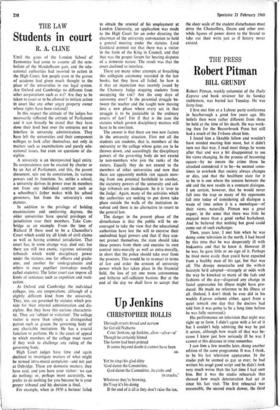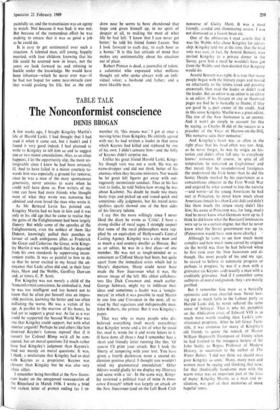Robert Pitman
THE PRESS BILL GRUNDY
Robert Pitman, weekly columnist of the Daily Express and book reviewer for its Sunday stablemate, was buried last Tuesday. He was forty-four.
first met him at a Labour party conference in Scarborough a good few years ago. His beliefs then were rather different from those he held at the time of his death. He was work- ing then for the Beaverbrook Press but still had a touch of the Tribune about him.
I found him a likeable fellow, and wouldn't have minded meeting him more, but it didn't turn out that way. I read most things he wrote after that and was a bit disappointed to see his views changing. In the process of becoming square—by no means the crime those he attacked considered it to be—he seemed some- times to overlook that society always changes or dies, and that the healthiest state for it to be in is one where the tension between the old and the new results in a constant dialogue. I am certain, however, that he would never fall into the trap so many of his opponents fall into today of considering all dialogue a waste of time unless it is a monologue—of their views, naturally. Pitman was a great arguer, in the sense that there was little he enjoyed more than a good verbal bashabout. And he believed that nothing but good could come out of such exchanges Then, years later, I met him when he was doing some television in the north. I had heard by this time that he was desperately ill with leuicaemia and that he knew it. However ill he was, he gave little or no sign of it. Perhaps he tired more easily than you'd have expected from a healthy man of his age, but that was all. The droopy moustache and the with-it hairstyle he'd adopted—strangely at odds with the way he knocked so many of the fads and fashions of the day—disguised any change in facial appearance his illness might have pro- duced. He made no reference to his illness at all. (Indeed, I don't think he ever did in his weekly Express column either, apart from a quiet remark one day that the doctors had told him it was going to be a long time before he was fully recovered.) His performance on television that night was right up to form. I didn't agree with a lot of it but I couldn't help admiring the way he put it across, although how much of that was be- cause I knew just how seriously ill he was I cannot at this distance in time remember.
I saw him a few months later, doing another edition of the same programme. It was, I think, to be his last television appearance. In the studio pub he seemed as gay as ever; he bad written his usupl good script and he didn't look very much worse than the last time I had seen him. But it was the studio rehearsals that showed how much deterioration had set in since his last visit. The first rehearsal was reasonable, the second much slower, the third painfully so, and the transmission was an agony to watch. Not because it was bad; it was not. But because of the tremendous effort he Was making to ensure that it was as good a job as he could do.
It is easy to get sentimental over such a situation. A talented man, still young, happily married, with four children, knowing that his life could be counted now iti hours, not the years we look forward to, and refusing to buckle _under the knowledge. He would have been inhuman—which he never ever was—if he had not hoped for some near-miracle cure that would prolong his life, but as the end
drew near he seems to have abandoned that hope and given himself up, in no spirit of despair at all, to making the most of what life he had left. 'I know that I can never get better,' he told his friend James Leasor, 'but I look forward to each day, to each hour as a bonus.' It is this last attitude of mind that makes any sentimentality about his situation out of place.
Robert Pitman is dead, a journalist of talent, a columnist who expressed what millions thought yet who spoke always with an indi- vidual voice; a husband and father; and a most likeable man.



































 Previous page
Previous page